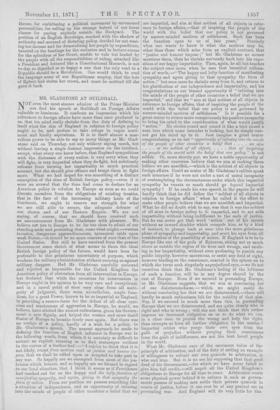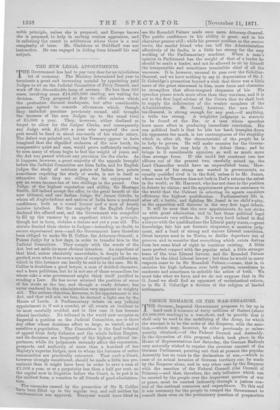MR. GLADSTONE AT GUILDHALL.
NOT even the most sincere admirer of the Prime Minister can find his speech at Guildhall on Foreign Affairs valuable or luminous. It confirms an impression which his references to foreign affairs have more than once produced in us, that his mind really shrinks from the duty of defining to itself what the aim of England in relation to foreign policy ought to be, and prefers to take refuge in vague senti- ment and kindly aspirations. It is in itself almost a mar- vellous power to be able to say so many things as Mr. Glad-
stone said on Thursday, not only without saying much, but without leaving a single distinct impression on the intellect, except, what every one knew before, that England sympathizes with the distresses of every nation, is very sorry when they will fight, is very impartial when they do fight, but sedulously refrains from turning her impartiality to much practical account, lest she should give offence and tempt them to fight more. What we had hoped for was something of a distinct conception of the aims of British foreign policy,—even if it were an avowal that the time had come to declare for an American policy in relation to Europe as soon as we could liberate ourselves from the obligations of existing treaties, that in the face of the increasing military hosts of the Continent, we ought to reserve our strength for what we are still able to secure, the adequate defence of our shores and of our Eastern Empire. We are not saying, of course, that we should have received such an announcement from Mr, Gladstone with pleasure. We believe our ties to Europe to be far too close to admit of our standing aside and protesting that, come what might,—wanton invasion, dangerous aggrandizemerits, tyrannical raids upon weak States,—it should be no more concern of ours than of the United States. But still to have received from the present Government some sketch of what seems to them the ideal British foreign policy of the future, would have been far preferable to this gelatinous uncertainty of purpose, which weakens the military administration without securing us against military dangers. Had Mr. Gladstone carefully reviewed and rejected as impossible for the United Kingdom the American policy of abstention from all intervention in Europe, but declared that while the occasions for intervention in Europe ought in his opinion to be very rare and exceptional, and in a moral point of view very clear from all ambi- guity of judgment, there were, nevertheless, ample fence tions, for a great Power, known to be as impartial as England, in providing a reserve-force for the defeat of all clear cyni- cism and wantonness of aggression in Europe, he would, we believe, have elicited the utmost enthusiasm, given his Govern- ment a new dignity, and helped the weaker and more timid States of Europe to breathe freely once again. But there was no vestige of a policy, hardly of a wish for a policy, in Mr. Gladstone's speech. The nearest approach he made to defining the function of English influence in Europe was in the following words, from which it is certainly as difficult to extract an explicit meaning as to find statuesque outlines in the curves of a feather-bed :—" I rejoice to think that it is
not likely, except from motives such as justice and honour int- pose, that we shall be called upon or tempted to take part in any war. So happily are we exempted from most of the jea- lousies which 'remain, and so happily are we blessed in regard .to our local situation, that I think it seems as if Providence had marked out for us the happy and the lofty function of manifesting sympathy, and again, giving to that sympathy the form of action. From our position we possess something like a situation of independence, and an opportunity of infusing into the minds of people of other countries a belief that we
are impartial, and aim at that noblest of all objects in refer- ence to foreign affairs,—that of inspiring the people of the world with the belief that our policy is not governed by narrow-minded motives of selfishness. Such has been
the function open to us of late years." Precisely what one wants to know is what the motives may be, other than those which arise from an explicit contract, that "justice and honour impose ;" but Mr. Gladstone no sooner mentions them, than he shrinks nervously back into his expo- sition of our happy impartiality. Then, again, he all but touches the subject once more, when he uses that beautiful colloca- tion of words,—" The happy and lofty function of manifesting sympathy and again giving to that sympathy the form of action ;" but once more he shrinks away from it, and returns to his glorification of our independence and impartiality, and his congratulations on our blessed opportunity of "infusing into the minds of the people of other countries a belief that we are impartial," and that we " aim at that noblest of all objects in reference to foreign affairs, that of inspiring the people of the world with the belief that our policy is not governed by narrow-minded motives of selfishness." Is it possible for a great orator to evince more conspicuously his positive incapacity to bring his mind to the consideration of what would justify " action." He circles round and round it like a bird round a nest, into which some intruder is looking, but he simply can- not get his mind up to it. Just imagine a great orator congratulating us on our "opportunity of infusing into the minds of the people of other countries a belief that . . . . we aim . . . at the noblest of all objects, . . . . that of inspiring the people of the world with the belief that our policy " is not selfish. Or, more shortly put, we have a noble opportunity of making other countries believe that we aim at making them believe we are unselfish,—which is the noblest of all objects in foreign affairs. Could an orator of Mr. Gladstone's calibre speak such nonsense if he were not under a sort of moral incapacity of contemplating the circumstances under which this impartial sympathy he vaunts so much should go beyond impartial sympathy ? If he reads his own speech in the papers he will hardly think that he did define the "noblest of all objects in relation to foreign affairs " when ho called it the effort to make other people believe that we are unselfish and impartial. What he did no doubt wish to say, was that it was the noblest of all aims in foreign policy to be impartial, and to act with impartiality without being indifferent to the ends of justice. But he can never got that word 'action' out of his mouth without an inward shudder which compels him, as by a kind of instinct, to plunge back at once into the more gelatinous phase of sympathy and impartiality, and avert his eyes from all consideration of the possibility of action. If England is to be to Europe like one of the gods of Epicurus, sitting not so much above as outside the region of its woes and wrongs, and exult- ing in her impartiality, without even professing to punish any public iniquity, however monstrous, or assist any deed of right, however binding on the conscience, enacted in the sphere on to which she turns such singularly unprejudiced eyes,—we do not ourselves think that Mr. Gladstone's feeling of the loftiness of such a function will be in any degree shared by the rest of Europe. Even if we succeed in persuading Europe, as Mr. Gladstone suggests, that we aim at convincing her of our disinterestedness,— which we might easily do without convincing her that we are disinterested,—there will hardly be much enthusiasm felt for the nobility of that aim. Nay, if we succeed in much more than this, in persuading Europe that we are disinterested, and see quite clearly who is right and who is wrong ; will she not think that this rather imposes an increased obligation on us to do what we can, in a clear case, to punish the wrong and help the right, than exempts us from all further obligation in the matter ? Impartial critics who purge their own eyes from the guilt of prejudice without purging their consciences from the guilt of indifference, are not the best loved people in the world.
What Mr. Gladstone says of the enormous value of the principle of arbitration, and of the duty of setting an example of willingness to submit our own quarrels to arbitration, is wise and true. But it is no use his supposing that that good deed of his Government,—for which we have never failed to give him full credit,—will acquit all the United Kingdom's obligations to Europe for all time to come. Arbitration wants some physical power behind it to enforce it, such as govern ments possess of making men settle their private quarrels in courts of justice, before it can ever be of any general use in preventing war. And England will do very little for the. noble principle, unless she is prepared, and Europe knows she is prepared, to help in curbing wanton aggression, and in enforcing the resort to arbitration where there is a real complexity of issue. Mr. Gladstone at Guildhall was not instructive. He was engaged in hiding from himself his real subject.



































 Previous page
Previous page